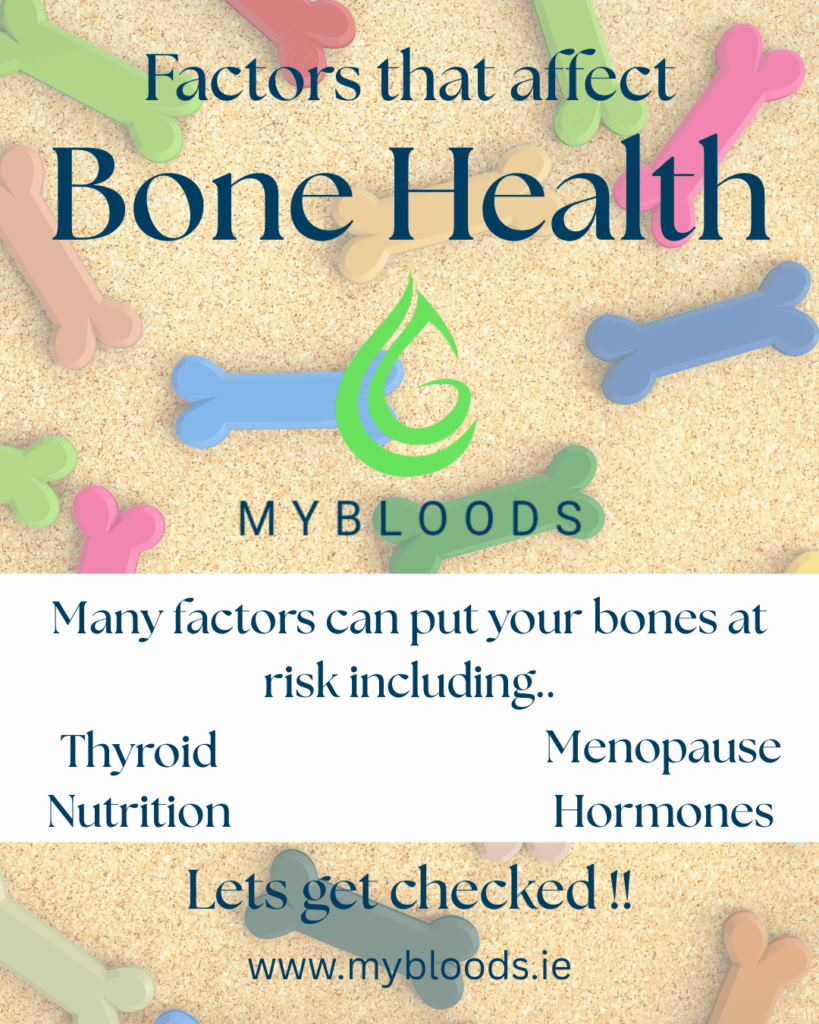
🦴 Factors Affecting Bone Health – What You Need to Know
Bone health is a critical component of overall wellness, yet it’s often overlooked until problems arise. Your bones do more than support your body — they protect vital organs, anchor muscles, store essential minerals, and play a vital role in your metabolic and hormonal systems. Maintaining strong, healthy bones throughout life is essential for mobility, independence, and quality of life.
In this article, we’ll explore the most important factors that affect bone health, how lifestyle choices can influence your bone strength, and how blood testing can help you take control of your bone health before issues arise.
💪 Why Bone Health Matters
From childhood to old age, bones are constantly renewing themselves. But as we age — especially for women — bone breakdown can outpace bone formation, increasing the risk of fractures, osteoporosis, and mobility issues. Poor bone health can lead to chronic pain, stooped posture, reduced independence, and longer recovery from injuries.
Strong bones support:
Posture and movement
Balance and fall prevention
Internal organ protection
Mineral storage (especially calcium and phosphorus)
Blood cell production via bone marrow
🧬 Key Factors That Affect Bone Health
Several biological, hormonal, and lifestyle factors influence bone strength and density. Understanding these can help you make informed decisions to preserve bone health long-term.
1. Menopause and Estrogen Loss
Estrogen is essential for maintaining bone density. During menopause, estrogen levels drop significantly, leading to faster bone loss in women — especially in the spine and hips. Women are at greater risk of osteopenia and osteoporosis after age 50.
2. Hormonal Imbalances
Sex hormones (estrogen and testosterone), growth hormone, cortisol, and others play a major role in bone metabolism. Imbalances — whether due to age, medical conditions, or medications — can impair bone regeneration.
3. Thyroid Disorders
An overactive thyroid (hyperthyroidism) can accelerate bone turnover, leading to a net loss in bone mass. Even mildly elevated thyroid levels can increase the risk of fractures over time if left untreated.
4. Nutrition Deficiencies
Bones need nutrients to remain strong, particularly:
Calcium – the main mineral in bones
Vitamin D – aids calcium absorption
Magnesium, vitamin K2, protein, and phosphorus – support bone formation and density
A poor diet or certain health conditions can reduce absorption of these vital nutrients.
5. Lifestyle Factors
Your daily habits play a major role in the longevity of your bones:
🚬 Smoking reduces bone density and slows healing
🍷 Excessive alcohol interferes with calcium absorption
🛋️ Physical inactivity leads to bone weakening
💊 Certain medications (e.g., steroids, anti-seizure drugs) can lead to bone loss with long-term use
🌿 How to Maintain Healthy Bones
Protecting your bones doesn’t require drastic changes — just smart, consistent habits:
✅ Eat a diet rich in calcium, vitamin D, protein, and green leafy vegetables
✅ Get 15–30 minutes of sunlight a day (for natural vitamin D)
✅ Engage in weight-bearing and resistance exercises
✅ Avoid smoking and limit alcohol intake
✅ Monitor your hormones, thyroid, and vitamin levels with regular blood tests
🧪 The Role of Blood Tests in Bone Health
Blood testing is one of the most effective and accessible ways to evaluate the internal markers that influence your bone health. With Mybloods, you can access comprehensive blood tests without a GP referral, with fast results and flexible appointments.
📋 Recommended Blood Tests for Bone Health:
Vitamin D – Low levels are a major risk factor for bone loss
Calcium – Essential for bone strength and mineralization
Parathyroid Hormone (PTH) – Helps regulate calcium levels
Thyroid Function Tests (TSH, Free T3, Free T4) – Detects thyroid disorders affecting bones
Estrogen / FSH / LH (for women) – Identifies hormonal shifts due to menopause
Testosterone (for men) – Low levels can lead to decreased bone mass
Alkaline Phosphatase (ALP) – Elevated levels may indicate increased bone turnover
Getting these tested regularly can help you spot nutrient deficiencies, hormonal imbalances, or underlying conditions before they lead to serious bone loss.
🎯 Why Choose Mybloods for Bone Health Testing?
At Mybloods, we make preventative healthcare accessible and hassle-free:
🕒 Fast results
📍 Convenient appointments with no referral needed
🔐 Private and confidential
💡 Comprehensive panels tailored to your age, gender, and goals
🔚 Final Thoughts
Bone health isn’t just an issue for the elderly — it’s a lifelong priority. With the right knowledge, lifestyle choices, and blood testing, you can take proactive steps to protect your bones, reduce your risk of osteoporosis, and stay strong for years to come.
🔗 Book your Bone Health Blood Panel today with Mybloods – your health, in your hands.
#BoneHealth #OsteoporosisAwareness #WomensHealth #MenopauseSupport #ThyroidHealth #VitaminDDeficiency #StrongBones #PreventativeHealth #BloodTestAwareness #HormoneBalance #HealthyAging #Mybloods